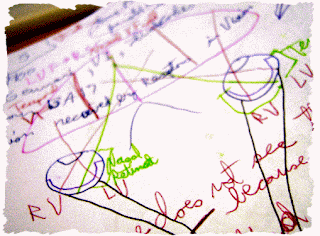One of the advantages in studying psychology is that you learn how brain processes occur (or at least the hypotheses of scientists about how they occur).We are far from knowing how it does work. In any case, the things we can state with more certainty are the factors that can slow down memory encoding.
Of course, we all KNOW cramming is bad, but maybe we should stop to study how to learn to study...
Thus, here are some hints provided by the study of human cognition on how to study properly and maximize retention.
First of all, the processing of the specific information you want to remember has to be transfer-appropriate. This means that the way you encode or represent some information in your mind should be retrieved or recalled in the same way. For example, if you learned about something in biology using pictures, drawing the biological processes would make you remember better when asked to recall the information.
Further more, when you rehearse information to be learned, you can either rehearse it in an maintenance way (i.e. repeating information taking into account only the physical properties of it) or in an elaborate way (i.e. considering the meaning of the information). Maintenance rehearsal is faster, but it is a shallow processing as you do not get in depth on what the information means. On the other hand, elaborate rehearsal is better for learning but takes longer.
Thirdly, when you learn something, the best way to remember something is to organize it in your mind using categories or labels. Thus, you can also chunk information together and creating one unit of information from two units of information.
Another important thing to remember is that learning is found to be state-dependant. In other words, if you study in a certain state and want to retrieve or remember what you studied, you would have to be in the same state for maximal recall. For example, if you studied in a empty room, for an exam, you would better recall the same information in a empty room. How noisy a room is can be a factor too. Thus, for best future recall, you should study the same material in different areas.
However, learning can also be dependent on the emotional state you are in. Therefore, when you are sad while studying, then you would remember better the information in a sad state.
Further more, when you relate the information to yourself, you are more likely to remember (called the self-reference effect). Therefore, make as many associations as possible with things you are familiar with. In that matter, the examples you find concerning certain theories are better than the ones of the teacher in the sense that you will better remember the theory. However, be careful that your own examples can be accurately linked to the theory in question that you are trying to remember.
Finally, if you do decide to cram, study small chunks of information at a time and take many breaks!!
By the way, the pictures of this post are of some of my notes. As you noticed, using pens of different colors is one of my strategies to remember better as I am a visual person...but that is another subject... for another post...
Finally, if you do decide to cram, study small chunks of information at a time and take many breaks!!
By the way, the pictures of this post are of some of my notes. As you noticed, using pens of different colors is one of my strategies to remember better as I am a visual person...but that is another subject... for another post...
Source:
Goldstein, E. Bruce (2008). Cognitive Psychology: Connecting Mind, Research, and Everyday Experience. Belmond, CA: Wadsworth Cengage Learning.
Goldstein, E. Bruce (2008). Cognitive Psychology: Connecting Mind, Research, and Everyday Experience. Belmond, CA: Wadsworth Cengage Learning.




Je doute qu'il y a du monde qui te demande tes notes pour réviser. haha! ;)
ReplyDeleteC'est vrai, t'en que la personne qui l'a écrit peut se relire...au moins 80% du temps...:)
ReplyDelete